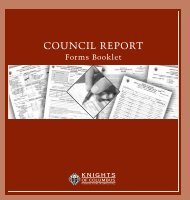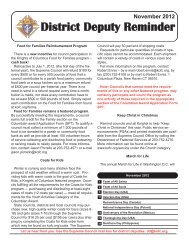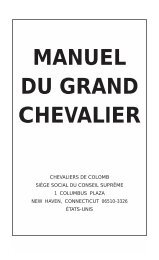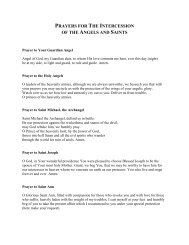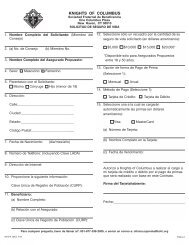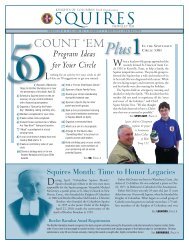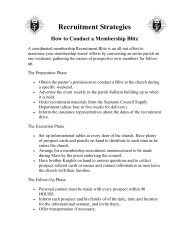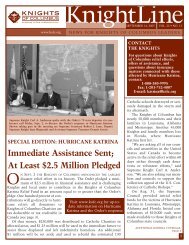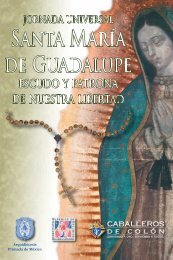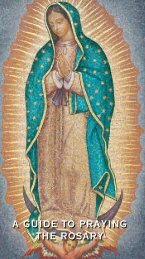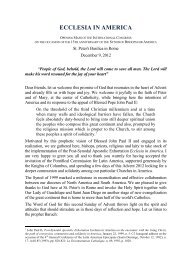CATHOLIC WORD BOOK - Knights of Columbus, Supreme Council
CATHOLIC WORD BOOK - Knights of Columbus, Supreme Council
CATHOLIC WORD BOOK - Knights of Columbus, Supreme Council
Create successful ePaper yourself
Turn your PDF publications into a flip-book with our unique Google optimized e-Paper software.
perishable and Whose existence is<br />
underived; 4) the limited goodness in the<br />
world must be a reflection <strong>of</strong> Unlimited<br />
Goodness; 5) all things tend to become<br />
something, and that inclination must have<br />
proceeded from some Rational Planner.<br />
R<br />
Racism: A theory which holds that any one<br />
or several <strong>of</strong> the different races <strong>of</strong> the<br />
human family are inherently superior or<br />
inferior to any one or several <strong>of</strong> the others.<br />
The teaching denies the essential unity <strong>of</strong><br />
the human race, the equality and dignity<br />
<strong>of</strong> all persons because <strong>of</strong> their common<br />
possession <strong>of</strong> the same human nature, and<br />
the participation <strong>of</strong> all in the divine plan <strong>of</strong><br />
redemption. It is radically opposed to the<br />
virtue <strong>of</strong> justice and the precept <strong>of</strong> love <strong>of</strong><br />
neighbor. Differences <strong>of</strong> superiority and<br />
inferiority which do exist are the result <strong>of</strong><br />
accidental factors operating in a wide<br />
variety <strong>of</strong> circumstances, and are in no way<br />
due to essential defects in any one or<br />
several <strong>of</strong> the branches <strong>of</strong> the one human<br />
race. The theory <strong>of</strong> racism, together with<br />
practices related to it, is incompatible with<br />
Christian doctrine.<br />
Rash Judgment: Attributing faults to<br />
another without sufficient reason; a<br />
violation <strong>of</strong> the obligations <strong>of</strong> justice and<br />
charity.<br />
Rationalism: A theory which makes the<br />
mind the measure and arbiter <strong>of</strong> all things,<br />
including religious truth. A product <strong>of</strong> the<br />
Enlightenment, it rejects the supernatural,<br />
divine revelation, and authoritative<br />
teaching by any church.<br />
-58-<br />
Recollection: Meditation, attitude <strong>of</strong><br />
concentration or awareness <strong>of</strong> spiritual<br />
matters and things pertaining to salvation<br />
and the accomplishment <strong>of</strong> God’s will.<br />
Relativism: Theory which holds that all<br />
truth, including religious truth, is relative,<br />
i.e., not absolute, certain or unchanging; a<br />
product <strong>of</strong> agnosticism, indifferentism,<br />
and an unwarranted extension <strong>of</strong> the<br />
notion <strong>of</strong> truth in positive science.<br />
Relativism is based on the tenet that<br />
certain knowledge <strong>of</strong> any and all truth is<br />
impossible. Therefore, no religion,<br />
philosophy or science can be said to possess<br />
the real truth; consequently, all religions,<br />
philosophies and sciences may be<br />
considered to have as much or as little <strong>of</strong><br />
truth as any <strong>of</strong> the others.<br />
Relics: The physical remains and effects <strong>of</strong><br />
saints, which are considered worthy <strong>of</strong><br />
veneration inasmuch as they are<br />
representative <strong>of</strong> persons in glory with<br />
God. Catholic doctrine proscribes the view<br />
that relics are not worthy <strong>of</strong> veneration. In<br />
line with norms laid down by the <strong>Council</strong><br />
<strong>of</strong> Trent and subsequent enactments,<br />
discipline concerning relics is subject to<br />
control by the Congregations for the<br />
Causes <strong>of</strong> Saints and for Divine Worship<br />
and the Discipline <strong>of</strong> the Sacraments.<br />
Religion: The adoration and service <strong>of</strong> God<br />
as expressed in divine worship and in daily<br />
life. Religion is concerned with all <strong>of</strong> the<br />
relations existing between God and<br />
human beings, and between humans<br />
themselves because <strong>of</strong> the central<br />
significance <strong>of</strong> God. Objectively<br />
considered, religion consists <strong>of</strong> a body <strong>of</strong><br />
truth that is believed, a code <strong>of</strong> morality<br />
for the guidance <strong>of</strong> conduct, and a form <strong>of</strong>



